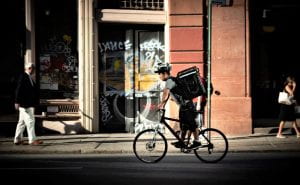By Bridget Anderson
Far from being ‘all in it together’ COVID-19 is exposing the mechanisms that promote and maintain inequality within as well as between states. In the UK, Sweden and the USA, among other countries, evidence is emerging that Black and Minority Ethnic (BAME) people are disproportionately likely to catch and die from coronavirus. Increased susceptibility is in part because of poorer living conditions and long-term health inequalities, but also the likelihood of working in ‘forward facing’ and essential jobs.
These discrepant vulnerabilities and their association with race and class divisions are acknowledged, but citizenship status has so far been overlooked in reports and data on those who have caught and died from the virus. In a recent EUI hosted webinar, Friedrich Poeschel illustrated that non-citizens account for a substantial share of employment in many sectors that are now defined as essential.

This includes health professionals: in the US 25% of doctors are non-citizens, in Switzerland 34%. In the UK, Matt Hancock, the Secretary of State for Health and Social Care tweeted on 17th November 2019: ‘It’s the National Health Service not the International Health Service. Everyone should make a fair contribution towards our NHS so after Brexit we’ll extend the NHS surcharge to all non-UK residents.’ But the staffing of the NHS is international: 37% of hospital doctors gained their qualification outside the UK. Furthermore, a report by the Migration Advisory Committee found that migrant nurses are paid 22% less than their UK national colleagues. The NHS surcharges Hancock is so pleased with are currently imposed on all non-EU citizens, meaning that nurses, doctors, care workers and others on the frontline have to pay a £400 annual ‘NHS surcharge’ for themselves and for each of their family members.
The second reading of the Immigration Bill was postponed on Tuesday. Perhaps the appetite for the crackdown on ‘low-skilled workers’ from abroad is flagging. The COVID crisis has exposed how many of the jobs on which our everyday lives depend – the hospital cleaners, supermarket shelf stackers, retail workers, drivers, carers and agricultural and food-processing workers – are low waged, low status and undertaken by BAME people and migrants. It suggests we have to go further than seeking to expand definitions of skill and challenge whether skill is an adequate measure of value at all.
One of the consequences of the focus of immigration policy on skills is that non-EU nationals working in these essential sectors may be on spousal visas, visitor visas, cultural exchange type visas, with permanent residence or simply working illegally. This is likely to be particularly true for the precarious workers in the gig economy who work via platforms such as Deliveroo, Instacart and Uber. It is notoriously difficult to measure the gig economy, and migrant participation in it is even more difficult, but evidence from the US and Europe suggests that migrant workers are a significant proportion of this labour force.
The vast majority of workers in the gig economy are vulnerable. This is not only because they do face-to-face work, but also because they typically have no employee benefits. Researchers in France surveyed bike delivery workers two days before and two days after lockdown and found that those workers with incomes under 1,000 Euros a month were most likely to keep on working.

Migrant workers are made additionally vulnerable because they often have no safety net at all. In the UK, for instance, many legally resident and legally working migrants have a condition of No Recourse to Public Funds (NRPF). This means that they cannot claim Universal Credit, which is the basic safety net for people who cannot work. There is a public health risk to having people in a situation where they are compelled to work. If the COVID-19 crisis has taught us anything it is that what is bad for migrants is not good for citizens, in fact we are seeing it is very bad for citizens as well.
One of the perceived advantages of migrant labour on migrant worker visas is that migrants are not only often lower waged but also easier to hire and fire as temporary workers. Time is an important factor in demand and supply of migrant worker visa holders, who usually enter on temporary programmes. COVID has exposed the taken-for-granted access to low-waged seasonal migrant labour with its flexibility and poor wages that relies not just on them wanting to come, but on international transport infrastructure, and sending states permitting their citizens to move.
These labour supply chains are not as resilient as imagined. The obvious example is seasonal agricultural workers. Producers in Canada, Australia, US and the European Union are seriously concerned about labour shortages and the European Commission last week called on member states to allow seasonal agricultural workers to travel within the EU as essential workers. Even at this time of lockdown in the UK, large farms have been chartering planes to bring in temporary workers and labour providers and last week requested the UK government to charter planes for labour supply.
One alternative to employing migrant labour and to improving employment conditions has been offshoring. But offshoring can reduce supply chain resilience. We are learning the hard way about the perils of fragile and long supply chains in vital supplies. The UK government might say that it makes more sense to import strawberries than to be dependent on seasonal agricultural workers. But that does not mean that British consumers are not dependent on low-waged migrant labour – they are just dependent on low-waged Moroccan labour working in Spain, instead, where the UK government has no levers of control over supply.
Let’s re-think how we value work, both in terms of money and status. And may the lessons from COVID last.
‘You Clap For Me Now’ – The coronavirus poem on racism and immigration in Britain.
Bridget Anderson is Professor of Migration, Mobilities and Citizenship at the University of Bristol and Director of Migration Mobilities Bristol.

